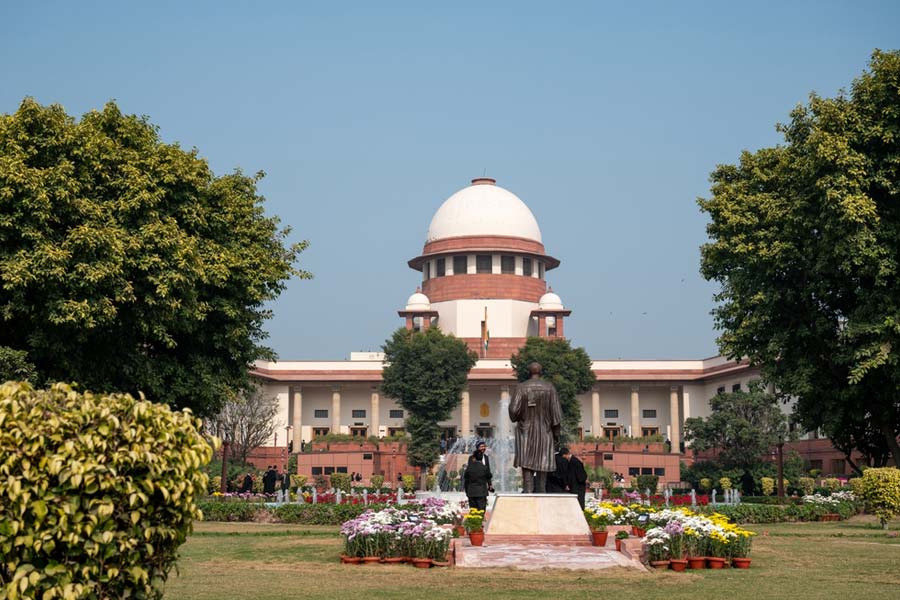The Supreme Court on Thursday suggested that Parliament revisit the Tenth Schedule of the Constitution relating to the anti-defection law to ensure that Speakers/ Chairpersons of legislatures do not indefinitely sit on pleas for disqualification of political turncoats.
The court said Parliament must ensure that the “very foundation of our democracy and the principles that sustain it are to be safeguarded”.
“Though we do not possess any advisory jurisdiction, it is for Parliament to consider whether the mechanism of entrusting the Speaker/ Chairman the important
task of deciding the issue of disqualification on the ground of defection is serving the purpose of effectively combating political defections or not.
“If the very foundation of our democracy and the principles that sustain it are to be safeguarded, it will have to be examined whether the present mechanism is sufficient or not. However, at the cost of repetition, we observe that it is for Parliament to take a call on that,” a bench of Chief Justice B.R. Gavai and Justice Augustine George Masih observed.
The court made the request while directing the Telangana Speaker to decide within three months the disqualification plea filed against three erstwhile Bharat Rashtra Samithi (BRS) legislators who defected to the Congress after it stormed to power in the November 2023 state elections.
The court noted that there had been frequent instances of Speakers indefinitely delaying their decision on disqualification pleas on defecting legislators, frustrating the objective of the enactment of the anti-defection law in 1985.
“With an experience of over 30 years on the workings of the Tenth Schedule to the Constitution, the question that we will have to ask ourselves is as to whether the trust which Parliament entrusted in the high office of the Speaker or the Chairman of avoiding delays in deciding the issue with regard to disqualification has been adhered to by the incumbents in the high office of Speaker and the Chairman or not?” CJI Gavai, who authored the judgment, observed.
He added: “Therefore, that we ask ourselves is as to whether the Speaker has acted in an expeditious manner, when expedition was one of the main reasons why Parliament had entrusted the important task of adjudicating disqualification petitions to the Speaker/ Chairman. Non-issuance of any notice for a period of more than seven months and issuing notice only after either the proceedings were filed before this court, or after this court had heard the matter for the first time, cannot by any stretch be envisaged as acting in an expeditious manner.
“In light of the facts of the present case, however, a failure to issue any direction to the Speaker, in our view, would frustrate the very purpose for which the Tenth Schedule has been brought in the Constitution. If we do not issue any direction, it will amount to permitting the Speaker to repeat the widely criticised situation of ‘operation successful, patient died’.”
In the present case, the plea for disqualification of the three erstwhile BRS MLAs — Danam Nagender, Venkata Rao Tellam and Kadiyam Srihari — was not considered for over seven months and it was only in January this year that the Speaker chose to initiate the process for dealing with the plea after the Supreme Court had issued notice in the matter on an appeal filed by Padi Kaushik Reddy, Kuna Pandu Vivekanand (both BRS) and Alleti Maheshwar Reddy (BJP) challenging an order passed by a division bench of Telangana High Court.
The division bench had set aside the directive of a single bench of the high court that had asked the Speaker to fix a schedule of hearing the disqualification plea within four weeks.
“We find that there was absolutely no occasion for the learned judges of the division bench of the high court to have interfered with the well-reasoned order of the learned single judge, as learned single judge had only asked the Speaker to fix a schedule of hearing (filing of pleadings, documents, personal hearing, etc.) within four weeks.
The learned single judge had not even issued any direction to decide the disqualification proceedings within a time-bound period. We, therefore, find that the division bench of the high court has erred in interfering with the order of the learned single judge of the high court,” CJI Gavai observed.
Accordingly, the Supreme Court said: “We direct the Speaker to conclude the disqualification proceedings pending against the 10 MLAs pertaining to the present appeals/ petition as expeditiously as possible and in any case, within a period of three months from the date of this judgment.”











